RV Fire is no joke! Thinking about your home catching on fire is scary enough… But especially when your home is an RV, bus, or van. There are several factors as to WHY an RV fire will burn quicker than a traditional sticks & bricks house. We’re going to discuss why RV’s are more “flammable” PLUS 3 things you NEED to do TODAY to keep you and your family safe from fire while on the road.
Some RV Families Lost It All
We’ve run across some news in the RV Community over the last few weeks about two different families that lost their homes to fires.
These homes were different from what you call a “traditional” home. One was a 2021 Heartland Toy Hauler 5th Wheel and the other was a city bus conversion that the family was remodeling to be their tiny home on wheels.
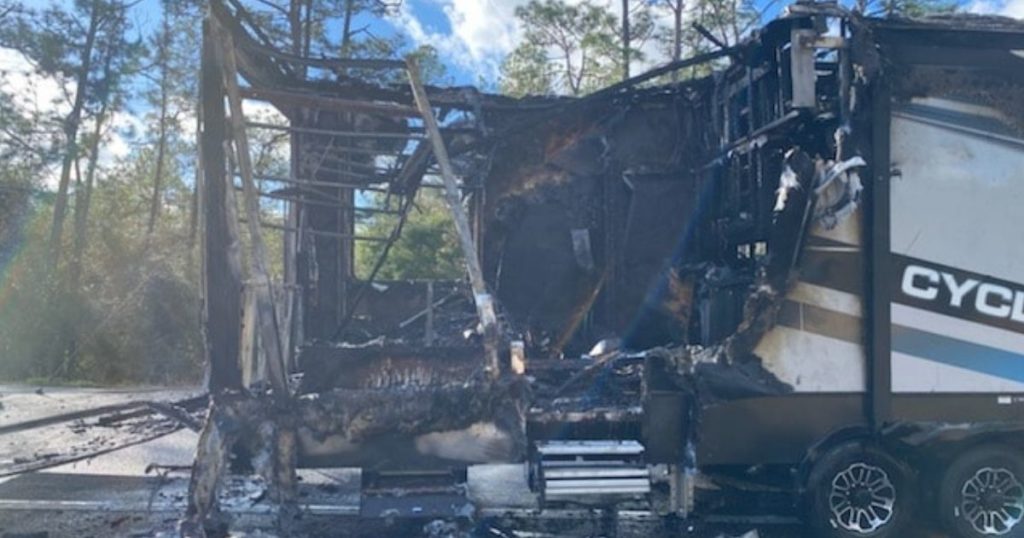
In the situation with the toy hauler (5th Wheel), while the exact cause of the fire is uncertain, this much is known. The fire started in the rear of the 5th wheel and the family did not even know it was on fire until it was much too late. In the situation of the family with the bus conversion, there was an explosion resulting in the fire.
In both situations, these families were full-time RVers. This means they LOST everything including their homes. One of the things we’ve seen with the RV community over and over is how well you all support one another. Well, here is a chance to do just that – show your support for fellow RV families who find themselves in need!
RV Fire & Protection
With RVing, van life, Bus-life, & Overlanding becoming more popular, there are more people on the road than ever before. Many people do NOT have adequate fire protection when it comes to their RV or understand the fire risks that are inherent with RVs.
So before we get into the 3 things you need to do TODAY to protect yourself in the event of a fire, we wanted to take a moment to make you aware of WHY fire hazards exist in RVs more so than sticks/bricks home.
RV Fires Are More Common Than You Think
On average there are approximately 4,000 RV fires per year. It’s reported that the number two cause of a fire is the RV refrigerator. Most RV refrigerators run off electrical and propane. This means an open flame on the rear of the fridge while the fridge is in LP mode (when no access to electricity is available). Many people run their RV fridges in propane mode while driving on a travel day to keep the fridge cool. While we are going to make a recommendation for or against this practice, we will tell you that it CAN be a fire hazard and encourage you to educate yourself on the risks before deciding if you do or do not want to leave your fridge in LP mode on travel days.
RV Fridge Fire
A common fire cause for an RV fridge fire is something flammable on the backside of the fridge. Things like a wasp nest built in the fridge area, spider webs, dust, leaves, and other debris easily enter this area. It then becomes an RV fire hazard and can ignite when the propane flame ignites.
There are other things with these absorption-style fridges that can cause fires as well. One thing can be when the RV is not level and the ammonia in the lines backs up and overheats. Overheating of the fridge is another common cause of fridge fires.
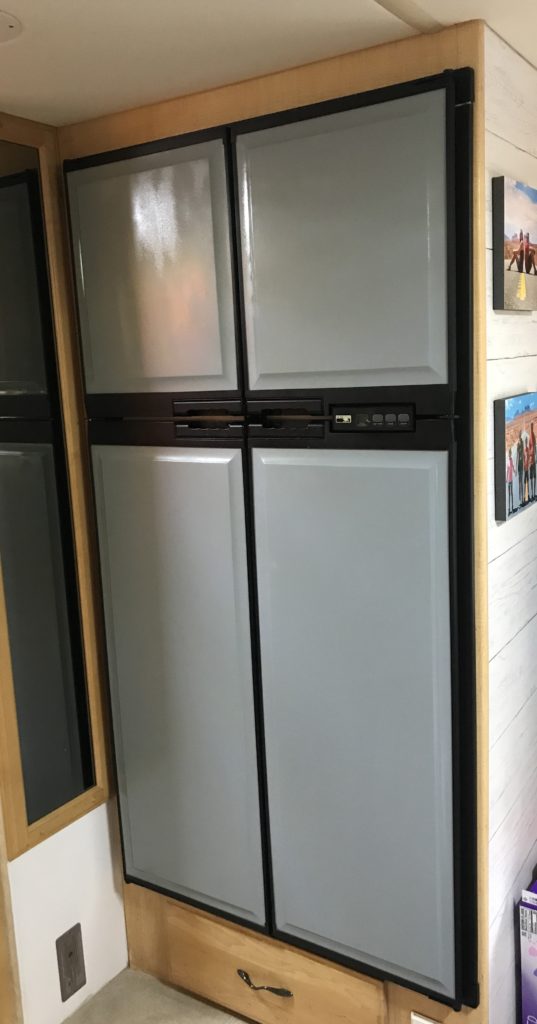
RV Fridge Recall – Fire Hazard
There was a lawsuit brought against the RV fridge manufacturer Dometic. This lawsuit states that every gas absorption refrigerator manufactured by Dometic since 1997 shares common technology, common cooling unit design, and common defects, including the propensity of the refrigerator’s cooling unit boiler tube to corrode, crack, and expel hydrogen gas at high pressure, which can spontaneously combust, or reach other ignition sources, causing a fire. Pretty Scary stuff!
We even once called a Mobile RV tech for an issue we had with our fridge and they told us that if it was a Norcold with the recall to install a high-temperature sensor they would not touch it. Even if the recall has been performed. It was too much of a liability risk for them.
A great idea is to Install a fridge fan on the back of the RV to help keep the backside of the fridge cool. We will have a link in the description below to the one we installed just last month. And it was a fairly easy install! We’re also seeing an improvement in the cooling operation of our fridge since installing the fan.
So if RV absorption fridges are the number two cause of RV fires, what is the number one cause of fire in an RV?
Number One Cause of RV Fire
The number one cause of RV fires is reported to be within the RV engine compartment, often in the electrical system. Wiring crimps that can short, fuel lines, and exhaust leaks can all be potential fire hazards.
Another cause can be the open flame on a propane stove while cooking. Things like oils and bacon grease can be highly flammable. Because RV kitchens are often small, things like paper towels, dish towels, etc tend to be in very close proximity to the stove. And if you have an open flame with a propane stove, this is a fire hazard.
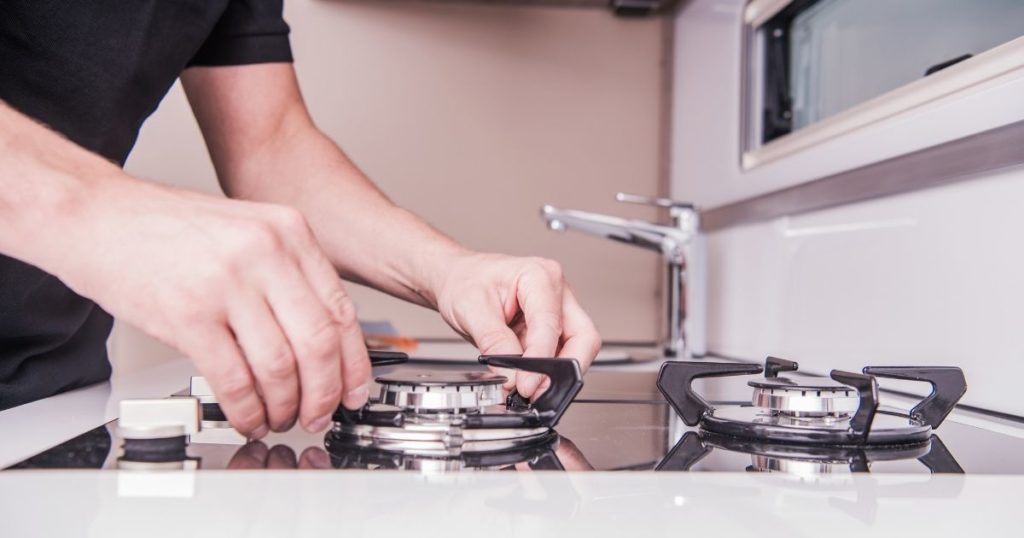
We removed our propane stove and installed an induction cooktop. And we have a microwave convection oven combo. Appliances like an Air Fryer which is a mini convection oven can also be used for baking instead of the propane stove.
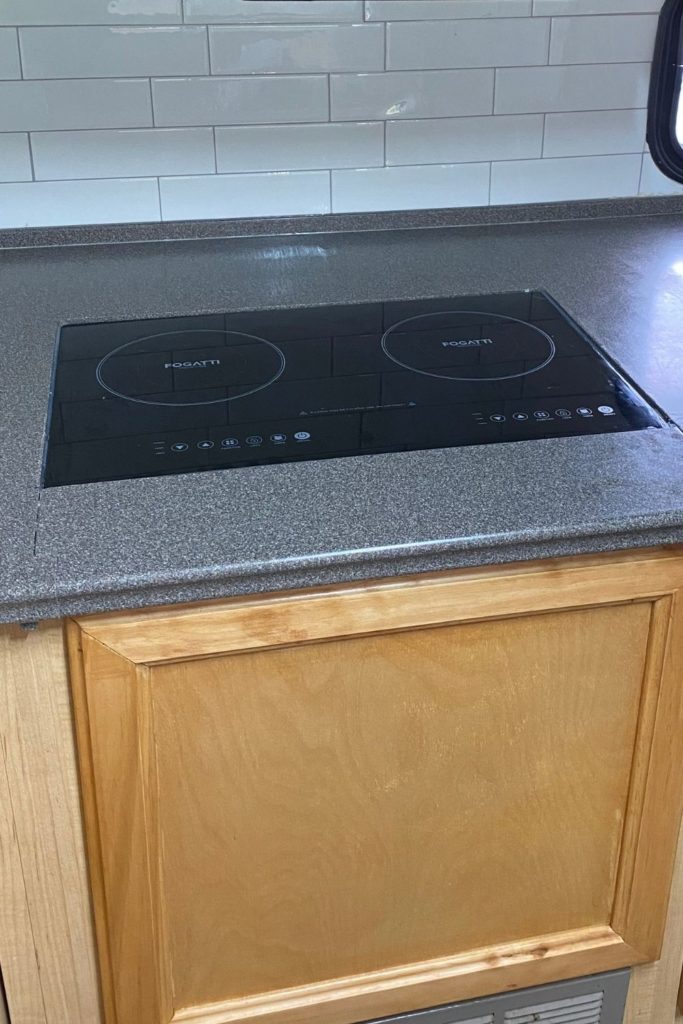
Batteries are a common cause of RV fires.
This is because batteries can give off hydrogen gas depending on the battery type which is highly flammable. Batteries need to be maintained depending on battery type, etc. We’ve seen several reports of RV fires over the past few years that were battery related.
3 Things To Prevent & Protect Yourself Against RV Fires
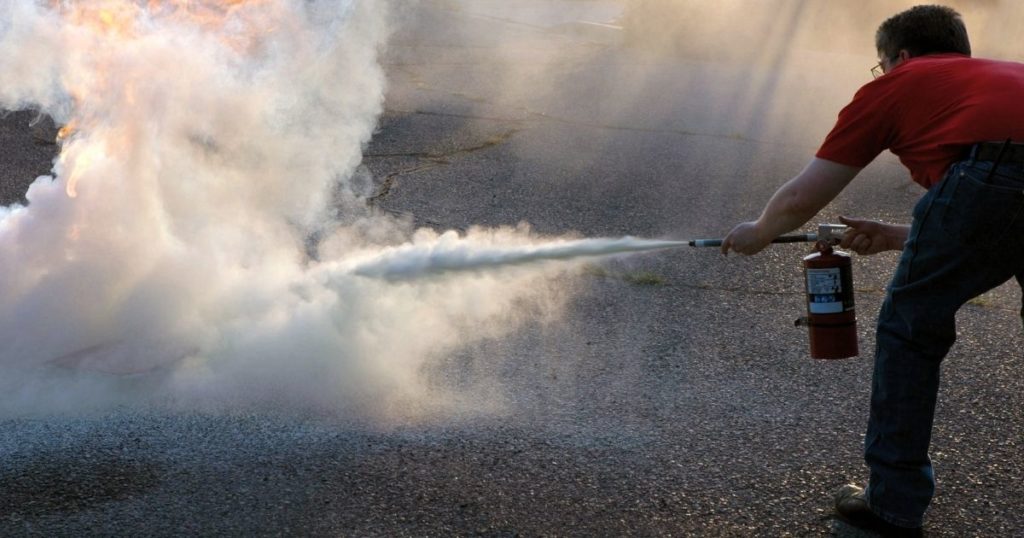
Check Your Propane Areas for Fire Hazards
Wasp nests, spider webs, etc. These would be areas like the back of the fridge & the water heater area. Also, be sure there are no flammable items near the stove if you have a propane stove. Things like a bottle of cooking oil, paper towels, or paper plates are a fuel source for a fire. Clear out and clean out all of these areas where a flame from the propane system is present.
Invest in Quality Fire Suppression
Have a larger fire extinguisher or multiple extinguishers on hand. We’ve seen several people share about an RV fire experience and they all share a similar story. A smaller fire extinguisher (the kind that comes with an RV) is NOT enough! You need a larger/higher-capacity extinguisher or multiple extinguishers. (We actually have 4 of them)!
No products found.
Also, consider a fire suppression system like the Proteng fire suppression system. These suppression systems are being used in areas like battery compartments or propane water heater areas. Anywhere a fire hazard exists.
Check the Batteries in Your RV Smoke Detector
Check the year on your RV Propane leak detector and batteries should be replaced from time to time. If you are NOT a full-time RVer the batteries in your smoke detector are subject to more extreme temperatures when your RV is not in use. That is, hot or cold. The batteries inside smoke detectors in these situations should be checked more often.
The propane detectors all have an expiration date on the back of them. Be sure to check this date and replace it if your detector is more than 7 years old.
RV Fire On Purpose
Our friends Marc & Julie Bennett recently conducted a grand experiment about RVs and fires. We highly encourage you to watch their ENTIRE video as it’s very educational and informative. Plus it gives some other great fire safety tips and resources for RVers.

What was the fan you bought for behind the Refrigerator?
Thanks
It’s this one from Amazon: https://amzn.to/48zw45q